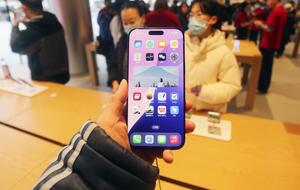Signalling a major shift for mobile users, the arrival of the iPhone Air was announced by the tech giant at its latest product event, as part of confirmation the thinnest addition yet to the iPhone family would be eSim-only.
While Apple has sold eSim-exclusive phones in the United States since 2022, this marks the first worldwide release.
Other new models, including the iPhone 17, iPhone 17 Pro and iPhone 17 Pro Max, will also be eSim-only in several markets, though they will retain Sim trays in most countries.
Kester Mann, an analyst at CCS Insight, told BBC News Apple’s decision “marks the beginning of the end of the physical Sim card”.
He added the move would “slowly change how people interact with their mobile provider” and could mean some customers will no longer need to visit high street stores.
But he added: “The change could be particularly important among older demographics or people who are less confident using technology.
“The industry needs to work hard to explain how to use eSims.”
Sim cards – Subscriber Identity Modules – are small plastic chips allowing phones to connect to mobile networks, handle calls and texts and access data.
Traditionally inserted into a tray within the device, they have been a familiar part of mobile use since the 1990s.
ESims, which are embedded in the handset, remove the need for plastic cards and trays, allowing users to switch providers digitally.
Paolo Pescatore, a technology analyst at PP Foresight, said: “In time, expect the Sim tray to disappear altogether.”
He said the transition offered “numerous benefits”, including saving internal space for larger batteries and reducing the use of plastic.
He also noted eSims could provide travellers with more provider options abroad and help avoid “bill shocks”.
Forecasts from CCS Insight suggest 1.3 billion smartphones with eSims were in use by the end of 2024, with the figure projected to rise to 3.1 billion by 2030.
Other major manufacturers, such as Samsung and Google, continue to provide physical Sim slots in many markets while adopting eSim technology.
Industry experts agree, however, the trajectory points toward the eventual disappearance of physical Sim cards.





